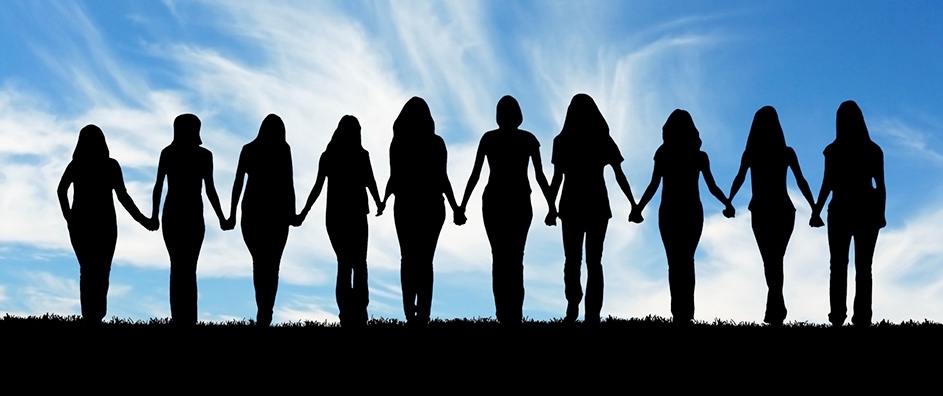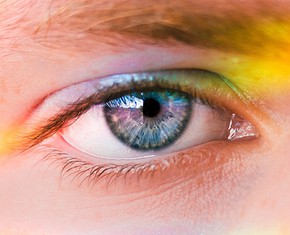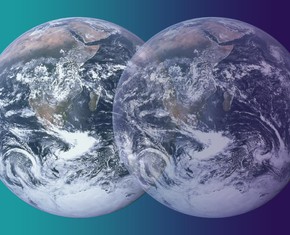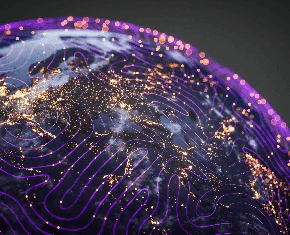The views expressed in our content reflect individual perspectives and do not represent the authoritative views of the Baha'i Faith.
…He Who is the Mother, the Soul, the Secret, and the Essence… – Baha’u’llah, The Book of Certitude, p. 213.
Islam recognizes one God, Allah, said to have ninety-nine names. Each name represents an attribute of the divine essence, a facet of ultimate reality.
In the Baha’i Faith, not only is there one God, but God is One: a unity constant through all faiths and times. As in Islam, this oneness reveals itself through many beautiful and powerful names.
…
We sit at a long banquet table, in an office in downtown Washington, D.C., an intense blue sky just visible through the venetian blinds. The three of us, all women, talk about the evolution of women’s presence and equality in Iran.
At the head of the table, historian Baharieh Rouhani-Maani speaks with soft steel. Her short black hair and lithe frame seem ageless, giving you the impression of a much younger woman, yet her words reveal impassioned knowledge, gained over decades of life and research.
When asked how she grew interested in recording history’s forgotten women, Baharieh takes us back to her Iranian childhood, when she first noticed the “sub-human” treatment men often displayed toward women. She began questioning, and – remarkably for that time and place – speaking up. Needless to say, she encountered stiff resistance. In those days, she tells us, “It was not socially acceptable for a young woman [to critique men’s behavior].”
During our conversation I am struck by her fluid blend of revolutionary fire and evolutionary practice. In her words: “Transformation has to be progressive in order to be effective.” One story in particular makes me catch my inner breath.
Baharieh talks about an encyclopedia project she took part in, asked to compile biographies of prominent Iranian Baha’is. She told the editors that she would help under one condition: Each entry must include the name of the person’s mother.
It was a bold request, for several reasons. First, fathers’ names were then the standard way of identifying a Persian lineage (as in: Farzad Shirazi, son of Muhammad Shirazi…). But mothers’ names rarely if ever found their way into official histories.
Second, Baharieh discovered that not only were mothers’ names excluded from history—they were, in fact, erased. Considered unimportant, they often went unrecorded. As she worked her way through the list of prominent individuals, one phrase kept recurring: Mother’s name unknown.
Returning to her editors, Baharieh insisted on including this phrase in all encyclopedia entries – a quiet memorial to these forgotten women, and an indictment against inequality.
Mother’s name unknown.
Mother’s name unknown.
Mother’s name unknown.
Baharieh’s story reminded me of two of the most paradoxical names of God from the Baha’i writings, the Manifest and the Hidden.
Historically, the Manifest aspect was present in the son – the man of action or intellect whose name is remembered, whose life is recorded. The Hidden aspect was present in the mother, whose name is lost, whose joys, hurts, loves, and subtleties conceal themselves behind a permanent veil.
A veil. One cannot speak of Iran without mentioning the veil.
Baharieh tells us of the most revolutionary acts of 19th and early 20th century Iranian women. So often, these acts involve unveiling in some way, moving from the hidden to the manifest. The most famous example is that of Tahirih Barghani (d. 1852), a fiercely principled poet and scholar, who shocked Iranian society by publicly unveiling herself before a gathering of noted male intellectuals. Her act shattered cultural norms, and Tahirih was later strangled to death – with her own veil.
Other groups of women targeted the “collective veil” – a literal curtain separating the sexes at social gatherings. By pulling this curtain aside, women included themselves in the sphere of power and visibility.
Revelation has always been considered the domain of male prophets and messengers. But through these stories, we learn that women – for all their hiddenness – are revealers too. Whether through self or social unveiling, women have initiated literal acts of “Revelation.” (from the Latin revelare “unveil, uncover, disclose.”)
As these hidden souls step into our line of sight, they bring truths gained through unsung hardships and the silent breaking-open of the heart.
…
I’m reading a book. It’s a Sunday afternoon, and I’m sitting in a round room, its colors blue-grey and warm brown. The rain-tinged winter sun shines weakly, and words drip soundlessly onto the surface of my mind. All is at peace, until my brain crashes into a single line:
“…He Who is the Mother, the Soul, the Secret, and the Essence…”
This quote comes from Baha’u’llah’s Book of Certitude, a core text of the Baha’i Faith. I’m reading it for the first time, and trying to contemplate and understand many passages. But this phrase knocks me back. In all the Abrahamic religions, we speak of God in the masculine. He is the Father, after all!
So to glimpse a reference to God as Mother – with the added twist of the male pronoun (He) – stuns me. It introduces me to the Baha’i belief in the genderless nature of the soul, where both masculine and feminine traits abide in harmony, where the equality of women and men forms a central principle.
The words that accompany this phrase stun me, too—for “God as Mother” further deepens into God as Soul, as Secret, and as Essence. Again, I recall the Hidden and Manifest aspects of the divine. It now occurs to me that these are not, as I thought before, paradoxical and opposed attributes.
As a friend recently said, “It seems to me, in human existence, wholeness and brokenness are two faces of the same reality.”
In our lives, wholeness is broken into new wholes. Mirror shards reflect a total unity. Even our partial and easily shattered identities reflect glimpses of a whole and unbreakable truth.
Can the same be said of the hidden-becoming-manifest, of the female and the male? If these paradoxical concepts connect and overlap, couldn’t the same be said of Mother and Father, male and female? They are integrities, yes. But what we see as opposites are not only complementary, they are distinct and integrated facets of the selfsame soul.
I close the book. Yes, I think to myself. God can be called by many names. And yet – the mystery remains. He is the Mother, whose name is Unknown.
















Comments
Sign in or create an account
Continue with Googleor